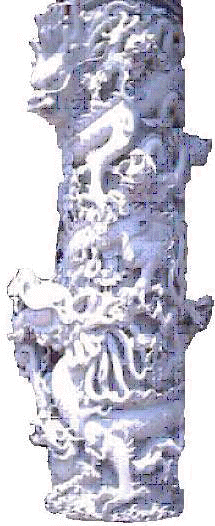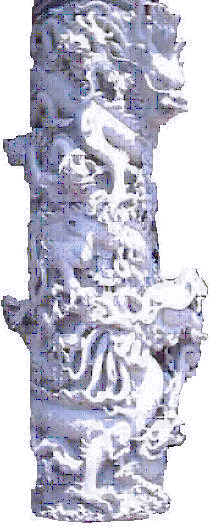


Longterm Technology
|
Longterm Technology |
|
科技新聞第 四季
2003/11/18 LAS VEGAS, Nevada (CNN) -- Spam, security and getting high-tech devices to communicate with each other are among the major challenges for the technology world, Microsoft's Bill Gates said at the annual Comdex technology convention. For the 20th year, Gates, chairman and chief software architect of the Seattle-based software company, presented the keynote address at Comdex. He told an audience of about 7,000 in Las Vegas that development has started on the next generation of Windows, code named "Longhorn." "Longhorn is a very ambitious piece of work," Gates said. "We're not even giving you a time-frame. In fact, a lot of people who got the prototype code said, 'Hey this looks pretty good. Gee, you must be close to getting this done.' Because of all the integration and the extreme high level of quality, there's still quite a bit to be done." Gates also said both technology and legal efforts may help curb spam, the unsolicited e-mails that clog inboxes and create headaches for Information Technology departments. He said Microsoft is using a tool called Smart Screen to determine the difference between legitimate mail and spam. "So Smart Screen is going to be in every mail thing we do, MSN, Hotmail, in Outlook: So that's a very big step forward there," he said. Comdex has taken on many different looks since its 1979 inception. Once a show for hard-core techies, it exploded during the dotcom bubble, with crowds reaching 200,000. This year, a re-designed show seems less about glitz and more about business. "There won't be any car companies or massage chairs. The new Comdex is a multi-dimensional educational forum," said Eric Faurot, Comdex vice-president and general manager. Attendance is expected to be between 40,000 and 50,000. The show, which runs through Thursday, is focused on seven themes: Wireless and Mobility, The Digital Enterprise, Web Services, Open Source and Linux, Windows Platform, On-Demand Computing and Security. Regardless of Comdex changes, die-hard techies still come for the cool gadgets. Some 550 companies will show off everything from laptop computers with real 3-D display to wristwatches that can hold 100 phone numbers and 500 e-mail addresses. A robotics "petting zoo" is scheduled Tuesday; with robots that can perform search and rescue at a disaster site and others that can water plants while the owners' are on vacation.
2003/12/01 BEIJING, China (Reuters) -- Sony Corp will launch its popular PlayStation 2 game console in China next month, saying it must be "courageous" in the face of rampant piracy that has plagued the vast potential market. The machine, which debuted in Japan in early 2000 and the United States in late 2001, will hit Chinese shelves on December 20 with a price tag of 1,988 yuan ($240). That compares to $179 in the United States. "We have to realize the reality, that piracy cannot be controlled 100 percent, not only in China but also in other parts of the world," Sony China Chairman Hiroshi Shoda told reporters Friday in an upscale Beijing cinema. "We have to be courageous, to face the reality." He declined to give sales projections. Sony has sold 62 million PlayStation 2 (PS2) consoles worldwide, and is heading into the holiday season hoping to cut costs and squeeze more profits out of the market-leading machine. PlayStation is crucial to the Japanese electronics giant's bottom line. Last year, the games division accounted for just 13 percent of sales, but nearly two-thirds of operating profits. Sony will initially sell the console in five Chinese cities -- Beijing, Shanghai, Guangzhou, Shenzhen and Chengdu, home to nearly 40 million people. More cities will follow. Only two or three games will be available at launch, priced at 168 yuan, or around $20, each, well below U.S. retail prices of $50 but above the dollar or two that pirated titles fetch on Chinese streets. Protecting interestsThe games include cartoonish action title Ape Escape 2, and ICO, an evocative and graphically impressive adventure game set in a huge castle. An average of three games are to hit the Chinese market every month. Sony said major game developers such as Konami Corp, Sega Corp, Namco Ltd and Taito Corp were also working on Chinese versions of their games. Sony also aimed to enlist Chinese game developers to write software for the machine, Shoda said. "I believe this encourages people to fight against piracy in order to protect their interests in intellectual property," he said. Sony planned to introduce future game products, such as its upcoming handheld PSP device and future PlayStation versions, in China at the same time as other countries. Sony's chief competitors are Microsoft Corp, which makes the Xbox console, and Japanese rival Nintendo Co Ltd, which sells the GameCube machine. Both consoles have sold about 10 million units. Though all the machines are sold in Chinese-speaking regions like Hong Kong and Taiwan, their makers have shunned the mainland because of rampant counterfeiting. Kou Xiaowei, deputy director of a division of China's General Administration of Press and Publication that oversees computer and video games, said he hoped others would follow Sony's lead. "Everyone has always had one regret, which is that video games represented by the PS2 have not entered China. This has created a huge void in the Chinese market. I feel that from today, this void has been broken by Sony's PS2," Kou said. In September, Nintendo said it would start selling a console developed specifically for the Chinese market. To thwart piracy, the machine uses a flash memory card to which games can be downloaded in stores.
2003/12/16 TOKYO, Japan (Reuters) -- Digital video disc (DVD) recorders armed with hard disk drives are at the heart of a digital electronics boom sweeping Japan and, if consumers can overlook their hefty price tags, they may soon replace the 50 million VCRs a year being sold globally. "It really is convenient: I record shows on to the hard drive and erase them later or copy the stuff I want to keep on to DVDs," said Daisuke Kouno, a 25-year old car mechanic and owner of a Pioneer Corp DVD recorder with an 80-gigabyte hard drive. Nomura Securities estimates the global DVD recorder market will reach 500 billion yen ($4.6 billion) this year, while Pioneer estimates global demand to more than double next year to 8.24 million units from a forecast for 3.6 million units this year. Market leader Matsushita Electric Industrial Co Ltd, maker of the Panasonic brand, Pioneer and Toshiba Corp gained an early advantage, but competitors at home and abroad are aggressively trying to close the gap with new products. Latecomer Sony Corp aims to make a splash with this weekend's launch of "PSX," an entertainment system that includes a DVD recorder with a hard disk drive plus a PlayStation 2 game machine and satellite TV tuner. "Just looking at reservations for the PSX, we have so much demand that we can barely handle it all," Sony president Kunitake Ando told Reuters in an interview last week. "We have no concerns about its sales." Electronics retailer BicCamera said it would open some of its stores an hour early on Saturday to handle PSX sales. Sony's DVD recorder market share has jumped to 20 percent from almost nothing since it began selling in November a new line-up called "sugoroku," roughly translated as "great recording," Ando said. DVD/HDD recorders sell for anywhere between 60,000 yen ($550) for one with an 80-gigabyte hard drive to 130,000 yen for one with a 250-gigabyte hard drive. Pioneer estimated last month DVD recorder prices would fall about five to 10 percent per year. A PSX with a 160-gigabyte HDD will sell for 79,800 yen and be able to record up to 204 hours of television. Sony will also sell a 250-gigabyte version, capable of recording up to 325 hours, for 99,800 yen. Moving overseasJapan accounts for nearly 60 percent of the world's DVD recorder demand, but electronics manufacturers expect the majority of sales in 2004 to come from North America and Europe. In the United States, the world's biggest electronics market, most DVD recorder models come without a hard disk drive. Gateway Inc rolled out a $349 DVD recorder in November, joining Philips, Thomson, and Samsung Electronics to offer a basic DVD recorder in the U.S. "DVD recorders are not selling so great in the United States. Obviously, price is one issue," said Noboru Kawaguchi, Pioneer's manager for DVD product planning. Another factor has been the popularity of TiVo, a VCR-sized black box that attaches to the back of a TV and stores programs onto a hard drive, which comes in 40-hour and 80-hour versions. TiVo Inc has over a million subscribers, who can program the set-top box to seek out and record a particular shows or a full season of episodes. It can also save shows based on viewing patterns. Pioneer is the only manufacturer to offer a DVD recorder compatible with TiVo, so heavy users can save their favorite programmes onto DVDs. Tokyo-based Pioneer offers two TiVo-compatible DVD recorders, an 80 GB version for $1,000 and a 120 GB version for $1,500. Those lofty prices stand as an obstacle to the growth of DVD recorders, but if history repeats itself prices of DVD recorders will fall sharply in the next few years. In six years, DVD players have grown to 60 million units worldwide, but an influx of cut rate models from Chinese and South Korean manufacturers forced out less efficient Japanese companies as profit margins turned razor-thin. "DVD recorders will also become commoditized in about five years, which means Japanese manufacturers must get as much as they can for the next few years," said one industry analyst. Compatibility hurdleAnother major obstacle for the DVD recorder industry is disagreement over a recording standard. There are three main recordable formats: DVD-RAM, DVD+RW, DVD-RW. Matsushita backs the DVD-RAM standard. It can be written, erased and rewritten 100,000 times, but it is not as widely compatible as DVD-RW. Pioneer backs the competing DVD-RW standard, which is compatible with almost everything, including personal computers and Sony's PS2, but sceptics say the recording is slower than DVD-RAM and DVD+RW. DVD+RW boasts better performance, but Sony's new PSX will not record or play discs in that format.
|